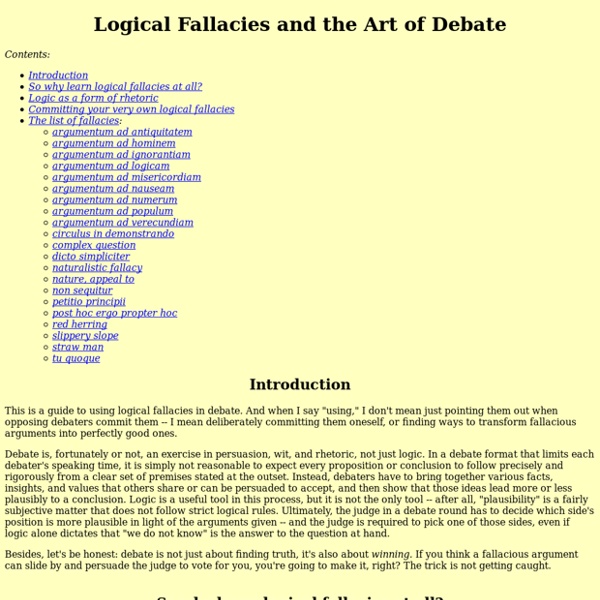Logical Fallacies: The Fallacy Files
How to Understand: 8 Timeless Thoughts from the Last 2500 Years
Image by *Zara (license). “Any fool can criticize, condemn, and complain but it takes character and self control to be understanding and forgiving.” Dale Carnegie ”All truths are easy to understand once they are discovered; the point is to discover them.” Galileo Galilei “The noblest pleasure is the joy of understanding.”Leonardo Da Vinci One of the interesting things about getting older and being interested in personal development is how you come to understand just how little you really understand. But how can we improve our understanding of ourselves and our world now? 1. “Everything that irritates us about others can lead us to an understanding of ourselves.” What we see in others is quite often what we see in ourselves. Therefore what you notice and what irritates you in others can teach you important things about yourself. 2. “To understand the heart and mind of a person, look not at what he has already achieved, but at what he aspires to.”Kahlil Gibran 3. “I hear and I forget. 4. 5.
A List Of Fallacious Arguments
attacking the person instead of attacking his argument. For example, "Von Daniken's books about ancient astronauts are worthless because he is a convicted forger and embezzler." (Which is true, but that's not why they're worthless.) Turing thinks machines think. (Note the equivocation in the use of the word "lies".)
Logical Fallacies
English Composition 1: Rational Appeal
Logos, along with ethos and pathos, make up a means of persuasion called the three appeals — three ways of persuading an audience (Covino and Jolliffe 15). Logos translates as "word" or "reason," and in rhetoric, logos refers to different systems of reasoning, working together to persuade an audience. Logos, pathos, and ethos are different but complementary methods of persuasion. Ethos moves an audience by proving the credibility and trustworthiness of the rhetor, pathos seeks to change the attitudes and actions of the audience by playing to the emotions of the audience, and logos persuades through the powers of reasoning (Covino and Jolliffe 17). Developing Logos For the ancient Greeks, logos meant more than logic or reasoning alone: it meant "thought plus action" (Covino and Jolliffe 17), "thought" being the ideas themselves and "action" being the way in which those ideas are presented to the audience.
Cliche List — The Best Thing Since Sliced Bread
Matthew McCartney, "Game Theory: a Refinement or an Alternative to Neo-classical Economics?", Post-Autistic Economics Review, issue 30
Game Theory: a Refinement or an Alternative to Neo-classical Economics? Matthew McCartney (SOAS, University of London, UK) © Copyright 2005 Matthew McCartney This paper1 is not intended to say much that is new, rather it takes issue with the traditional manner in which economics has presented game theory. Neo-classical economics, Game Theory and General Equilibrium The intellectual centrepiece of neo-classical economics is general equilibrium. There is nothing inherently neo-classical about general equilibrium. The key assumption that distinguishes a game theory world from a neo-classical economy is that of interdependence. There are a variety of assumptions in the neo-classical version of general equilibrium necessary to prove the existence, the uniqueness and stability of equilibrium. Figure Two In this example (fig two) there are multiple equilibria4. Gravelle and Rees (1992) do not deal explicitly with game theory, but use it to model the behaviour of oligopolies (Chapter 12). a)a. b.
How to Disagree
March 2008 The web is turning writing into a conversation. Twenty years ago, writers wrote and readers read. Many who respond to something disagree with it. The result is there's a lot more disagreeing going on, especially measured by the word. If we're all going to be disagreeing more, we should be careful to do it well. DH0. This is the lowest form of disagreement, and probably also the most common. u r a fag!!!!!!!!!! But it's important to realize that more articulate name-calling has just as little weight. The author is a self-important dilettante. is really nothing more than a pretentious version of "u r a fag." DH1. An ad hominem attack is not quite as weak as mere name-calling. Of course he would say that. This wouldn't refute the author's argument, but it may at least be relevant to the case. Saying that an author lacks the authority to write about a topic is a variant of ad hominem—and a particularly useless sort, because good ideas often come from outsiders. DH2. DH3. DH4. DH5.



